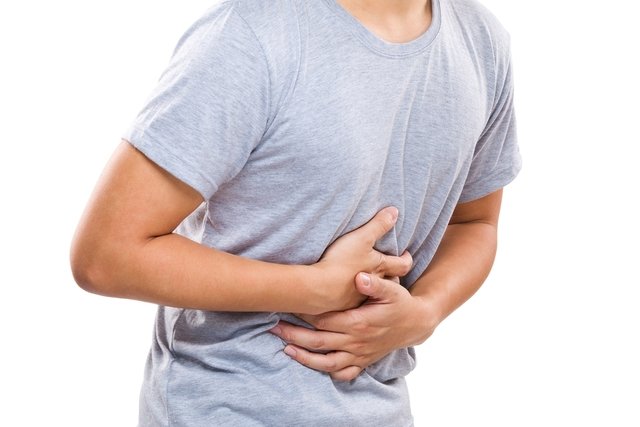Gas remedies, such as simethicone, activated charcoal or the enzyme alpha-D-galactosidase, are excellent options for relieving the pain and discomfort caused by excess gastrointestinal gas.
These remedies generally act quickly, but there are also home remedy options that can be used in the form of tea to relieve gas, such as fennel tea or peppermint tea, which may have fewer side effects.
Before taking medication for gas, it is important to consult your general practitioner or gastroenterologist, as excess gas can be caused by diseases such as irritable bowel syndrome or functional dyspepsia. Check out other causes of excess intestinal gas.

Pharmacy remedies
The pharmacy remedies normally recommended by the doctor for gas are:
1. Simeticona
Simethicone is a medicine that helps reduce gas retention as it acts by breaking the bubbles that retain gases, facilitating their elimination and helping to relieve discomfort, pain and pressure caused by excess gas in the stomach or intestine.
This remedy should not be used in case of allergy to the components of the formula and in cases of intestinal obstruction or perforation. Furthermore, during pregnancy or breastfeeding, simethicone should only be used if recommended by a doctor.
How to use: simethicone must be taken orally, and the normally recommended dose for adults is 80 to 125 mg, 3 to 4 times a day, that is, every 6 to 8 hours, not exceeding the maximum dose of 500 mg per day . See how to take simethicone.
Dimethicone is a medicine that helps relieve gas, as it acts as an anti-foam, that is, it breaks the bubbles that trap gas, relieving abdominal bloating and discomfort caused by excess gas.
Generally, dimethicone is found in combination with other substances, such as metoclopramide and pepsin (Digeplus), for example, also helping to treat other stomach symptoms in addition to intestinal gas, such as swollen belly, abdominal pain, poor digestion or excessive burping. .
This medicine should not be used by children, adolescents, pregnant or lactating women, or by people who have bleeding, gastrointestinal obstruction or perforation, Parkinson’s disease or a history of epilepsy.
How to use: the dose of dimethicone + metoclopramide + pepsin (Digeplus) for adults is 1 to 2 capsules, before main meals, or as advised by the doctor. The maximum daily dose should not exceed this number of capsules.
3. Activated charcoal
Activated charcoal is a good option for reducing intestinal gas, as it works by absorbing gas particles in the stomach or intestine. Furthermore, this remedy has anti-diarrheal properties, as it prevents the activation of toxins and the action of microorganisms in the gastrointestinal tract, helping to relieve diarrhea and excess gas.
This remedy should not be used by children under 2 years of age or by people who are allergic to any component of the formula. Vegetable activated charcoal should also not be used by children in the case of acute or persistent diarrhea. Furthermore, during pregnancy or breastfeeding, activated charcoal should only be used if recommended by a doctor.
How to use: The activated charcoal tablet must be taken orally, and the normally recommended dose for adults is 4 to 6 tablets per day, in two divided doses, between meals, or as advised by the doctor.
4. Alfa-D-galactosidase
Alpha-D-galactosidase is a good option for a remedy for gas, as it is an enzyme that breaks down sugars from carbohydrates, aiding digestion and reducing excess gas caused by intestinal fermentation of foods such as legumes, chickpeas or lentils, for example. example.
This remedy can be used by adults or children over 12 years of age. However, it is recommended to consult your doctor to advise on the appropriate dose and duration of use.
How to use: alpha-D-galactosidase must be taken orally and the dose must be advised by the doctor, as it varies according to the symptoms.
5. Lactase tablets
Lactase tablets may be indicated in the case of excess intestinal gas caused by lactose intolerance, as they help the body to digest foods that contain lactose, preventing symptoms caused by a deficiency of this enzyme, such as a swollen belly, pain and abdominal gas.
This medicine should not be used by diabetics, people who suffer from galactosemia or who are allergic to any component of the tablet.
How to use: The lactase tablet must be used orally, before ingesting foods containing lactose, and the dose must be advised by the doctor or nutritionist, after the lactase enzyme deficiency has been diagnosed.
6. Rifaximina
Rifaximin is an oral antibiotic that helps reduce belly swelling and gas production, due to its effect against gas-producing bacteria. This medicine is generally indicated against intestinal bacteria in people with hepatic encephalopathy.
The use of this remedy should only be done with medical advice, who can guide the dose and treatment time according to the condition to be treated, and should not be used in cases of intestinal obstruction or allergy to the components of the formula.
How to use: The generally recommended dose of rifaximin for adults is 1 tablet, orally, twice a day, or as prescribed by a doctor.
7. Probiotics
Probiotics are live microorganisms that can help deflate the stomach and reduce excess gas. Probiotics can be found in fermented foods, such as natural yogurt, kefir and sauerkraut, for example. Furthermore, they can be found in the form of capsules, liquids or sachets, sold in pharmacies or health food stores.
Ideally, probiotic foods and products include Bifidobacterium lactis or Bifidobacterium longumfor example, as they help reduce the amount of intestinal gas and inflammation, as they promote the digestion of fiber, which helps prevent gases from appearing as the final product of their fermentation, in addition to normalizing the amount of pro-inflammatory substances , such as cytokines.
How to use: To maintain healthy intestinal flora, it is recommended to consume at least 1 probiotic source food per day. In the case of supplements, it is important to consult a doctor or nutritionist and read the label to find out what dose should be taken. See more about probiotics.
Natural remedy options for gas
Some natural remedies for intestinal gas are teas or infusions made with:
- Anise, nutmeg, cardamom or cinnamon: favor the elimination of gases;
- Anise: prevents muscle contractions by promoting relaxation of the intestinal muscles;
- Ginger: aids digestion and improves cramps because it reduces muscle spasms;
- Pepper mint: reduces natural bowel movements, preventing gases from being expelled. It is not recommended for those suffering from constipation.
Tea from these herbs are excellent natural remedies to treat problems related to gas that cause pain, bloating and abdominal discomfort. Learn how to prepare teas with herbs that help treat gas.
How to avoid gases
To avoid the production of gases, it is important to make some lifestyle changes such as:
- Reduce the consumption of fats in your diet;
- Consume foods low in lactose;
- Avoid carbonated or carbonated drinks, such as soft drinks or beer;
- Avoid chewing gum;
- Walk for about 15 to 30 minutes after meals;
- Avoid smoking.
Furthermore, it is recommended to reduce your intake of foods that cause gas, such as beans, broccoli or onions, for example, and consult a nutritionist in the case of diseases that cause excess gas, such as irritable bowel syndrome, to receive guidance. adequate food. Find out what your diet should be like for irritable bowel syndrome.

Sign up for our newsletter and stay up to date with exclusive news
that can transform your routine!
Warning: Undefined array key "title" in /home/storelat/public_html/wp-content/plugins/link-whisper-premium/templates/frontend/related-posts.php on line 12
Warning: Undefined array key "title_tag" in /home/storelat/public_html/wp-content/plugins/link-whisper-premium/templates/frontend/related-posts.php on line 13




